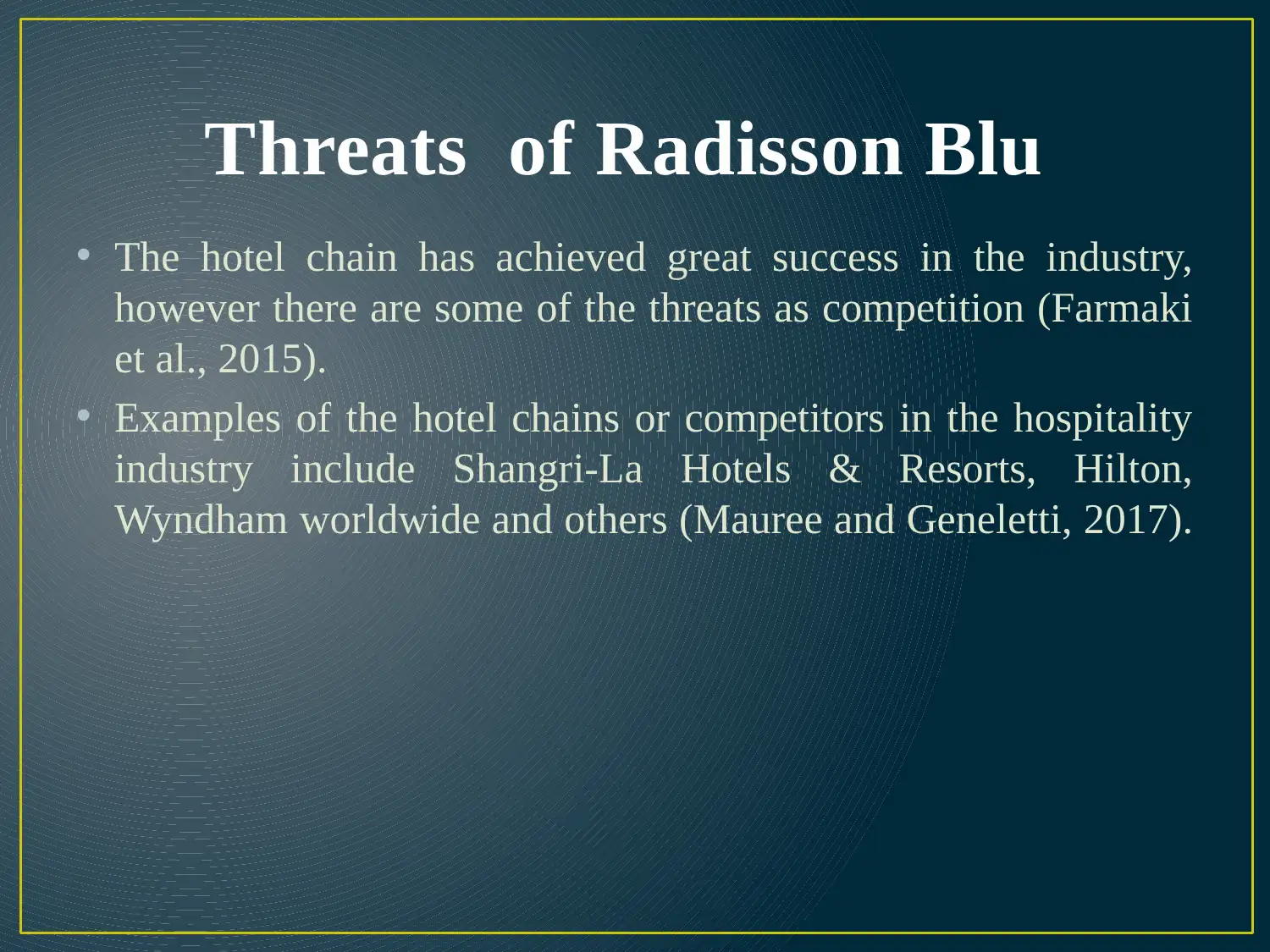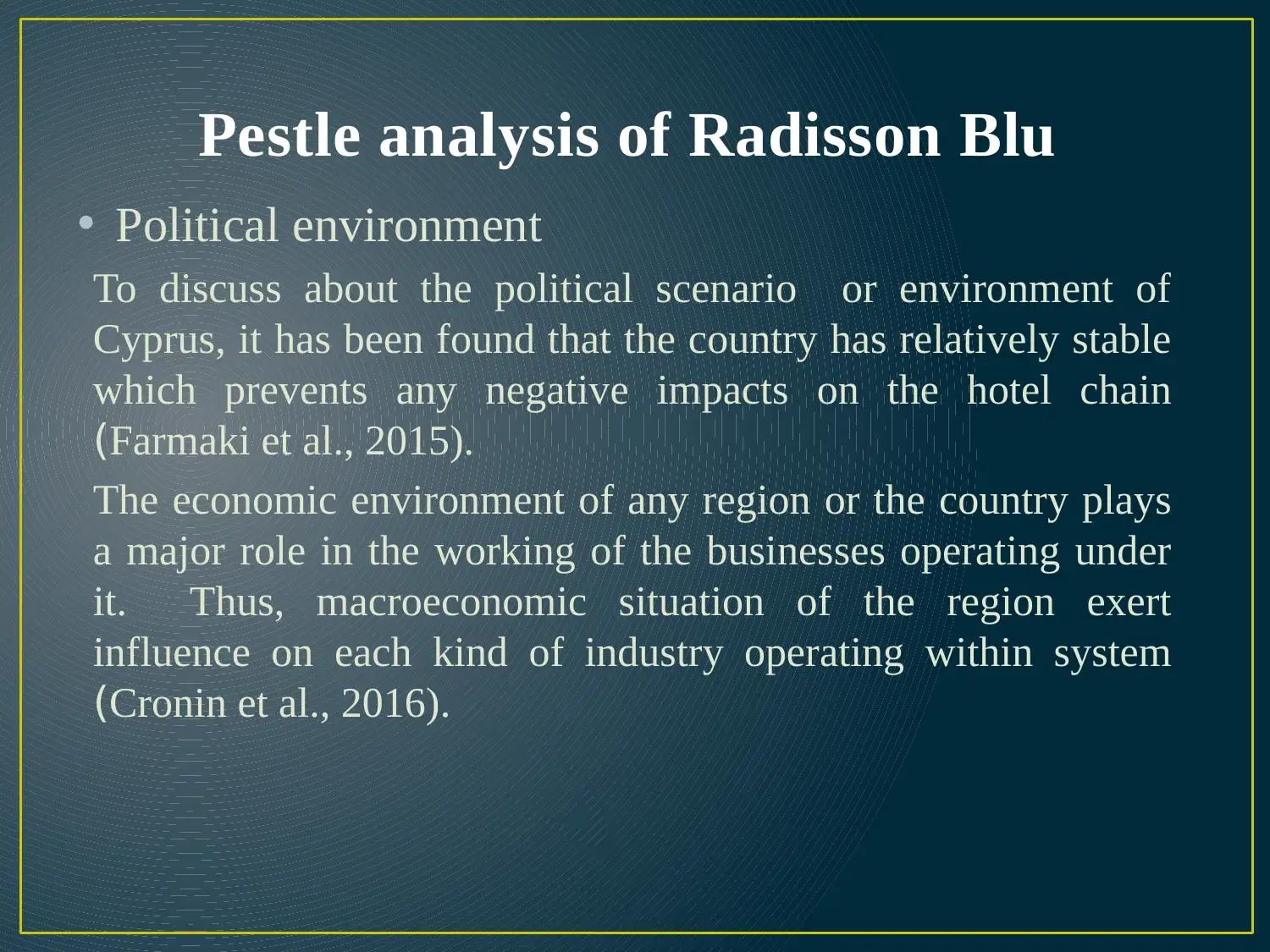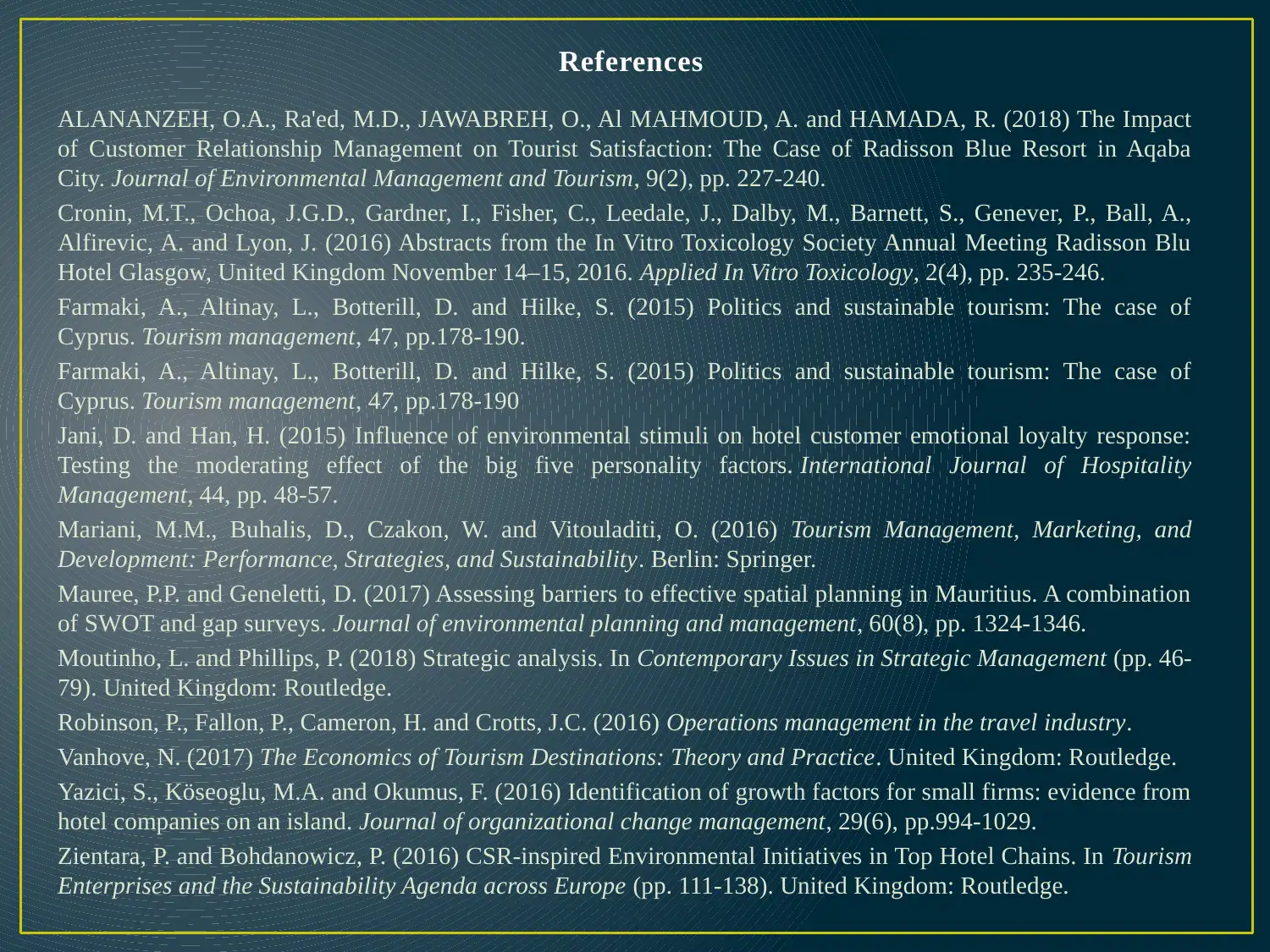SWOT and PESTLE Analysis of Radisson Blu Hotel, Larnaka, Cyprus
VerifiedAdded on 2023/04/21
|11
|1178
|216
Presentation
AI Summary
This presentation provides a comprehensive SWOT and PESTLE analysis of the Radisson Blu Hotel in Larnaka, Cyprus, examining the internal strengths and weaknesses, as well as external opportunities and threats impacting the hotel's operations. The SWOT analysis highlights the hotel's large customer base and strong brand recall as strengths, while high promotion costs are noted as a weakness. Opportunities lie in changing market trends focused on service improvement. Threats include competition from other hotel chains. The PESTLE analysis assesses the political stability of Cyprus, its tourism-dependent economy, social environmental factors, technological infrastructure, and legal and environmental regulations. The analysis concludes that dedication and patience are vital for the hotel's continued success. Desklib provides access to this and many other solved assignments.

Radisson Blue
Hotel – Swot
and Pestle
Analysis
Hotel – Swot
and Pestle
Analysis
Paraphrase This Document
Need a fresh take? Get an instant paraphrase of this document with our AI Paraphraser

The presentation brings about the discussion on the assessment
of the Radisson Blu Hotel, Larnaka Cyprus, which is an
international chain of full service hotels and resort brands for
Radisson hotels.
The assignment will discuss the Swot and Pestle analysis of the
Hotel and the impact of issues on the growth and development
of the organisation.
Swot analysis refers to the strategic planning method which
evaluates the strengths, weakness, opportunities or threats in
context to any business organisation.
of the Radisson Blu Hotel, Larnaka Cyprus, which is an
international chain of full service hotels and resort brands for
Radisson hotels.
The assignment will discuss the Swot and Pestle analysis of the
Hotel and the impact of issues on the growth and development
of the organisation.
Swot analysis refers to the strategic planning method which
evaluates the strengths, weakness, opportunities or threats in
context to any business organisation.

SWOT Analysis of Radisson Blu
• One of the major strength of Radisson Blu in
Cyprus is large customer base, as it attracts more
than two million tourists annually.
• The hotel chain also have wide target segments
and high brand recall in the industry.
• Radisson Reward program has been a well known
aspect of the high demand for the services from the
customers (ALANANZEH et al., 2018).
• One of the major strength of Radisson Blu in
Cyprus is large customer base, as it attracts more
than two million tourists annually.
• The hotel chain also have wide target segments
and high brand recall in the industry.
• Radisson Reward program has been a well known
aspect of the high demand for the services from the
customers (ALANANZEH et al., 2018).
⊘ This is a preview!⊘
Do you want full access?
Subscribe today to unlock all pages.

Trusted by 1+ million students worldwide

Weaknesses of Radisson Blu
• High promotion costs is one of the weaknesses of the hotel
chain as the Radisson group has planned to expand and
reposition itself in the market.
• Too much spread or increased number of segments (Yazici,
Koseoglu and Okumus, 2016).
Opportunities
• Changing market trends and the focus has been shifted
towards improving service, which determines the opportunities
available in the future (Zientara and Bohdanowicz, 2016).
• High promotion costs is one of the weaknesses of the hotel
chain as the Radisson group has planned to expand and
reposition itself in the market.
• Too much spread or increased number of segments (Yazici,
Koseoglu and Okumus, 2016).
Opportunities
• Changing market trends and the focus has been shifted
towards improving service, which determines the opportunities
available in the future (Zientara and Bohdanowicz, 2016).
Paraphrase This Document
Need a fresh take? Get an instant paraphrase of this document with our AI Paraphraser

Threats of Radisson Blu
• The hotel chain has achieved great success in the industry,
however there are some of the threats as competition (Farmaki
et al., 2015).
• Examples of the hotel chains or competitors in the hospitality
industry include Shangri-La Hotels & Resorts, Hilton,
Wyndham worldwide and others (Mauree and Geneletti, 2017).
• The hotel chain has achieved great success in the industry,
however there are some of the threats as competition (Farmaki
et al., 2015).
• Examples of the hotel chains or competitors in the hospitality
industry include Shangri-La Hotels & Resorts, Hilton,
Wyndham worldwide and others (Mauree and Geneletti, 2017).

Pestle analysis of Radisson Blu
• Political environment
To discuss about the political scenario or environment of
Cyprus, it has been found that the country has relatively stable
which prevents any negative impacts on the hotel chain
(Farmaki et al., 2015).
The economic environment of any region or the country plays
a major role in the working of the businesses operating under
it. Thus, macroeconomic situation of the region exert
influence on each kind of industry operating within system
(Cronin et al., 2016).
• Political environment
To discuss about the political scenario or environment of
Cyprus, it has been found that the country has relatively stable
which prevents any negative impacts on the hotel chain
(Farmaki et al., 2015).
The economic environment of any region or the country plays
a major role in the working of the businesses operating under
it. Thus, macroeconomic situation of the region exert
influence on each kind of industry operating within system
(Cronin et al., 2016).
⊘ This is a preview!⊘
Do you want full access?
Subscribe today to unlock all pages.

Trusted by 1+ million students worldwide

To state more about the economic environment in Cyprus it
has been found that the economic system of this region is
largely dependent on the tourism and related activities such as
operations of various hotel chains in the hospitality industry
(Robinson et al., 2016).
The importance of social environmental factors has been
highly related to the tourism, or hospitality industry. Like the
economic trends, and aspects the social environment also
shapes the hospitality industry (Mariani et al., 2016).
has been found that the economic system of this region is
largely dependent on the tourism and related activities such as
operations of various hotel chains in the hospitality industry
(Robinson et al., 2016).
The importance of social environmental factors has been
highly related to the tourism, or hospitality industry. Like the
economic trends, and aspects the social environment also
shapes the hospitality industry (Mariani et al., 2016).
Paraphrase This Document
Need a fresh take? Get an instant paraphrase of this document with our AI Paraphraser

Technological Environment
• Discussing about the technological factors or aspects it states
about the infrastructure of the hotel chain which attracts large
number of consumers in the industry (Vanhove, 2017).
• Discussing about the technological factors or aspects it states
about the infrastructure of the hotel chain which attracts large
number of consumers in the industry (Vanhove, 2017).

Legal and Environmental factors
• Legal factors in context to the businesses in any industry
includes the factors such as tax system, or rates, or the laws
and regulations for conducting trade within a specific region
(Moutinho and Phillips, 2018).
• Environmental factors has gained more importance from the
past few years. These factors consist of the issues of scarcity of
raw materials, pollution targets, ethical standards and business
practices. Thus, these are considered vital to the performance
of the hotel chain (Jani and Han, 2015).
• Legal factors in context to the businesses in any industry
includes the factors such as tax system, or rates, or the laws
and regulations for conducting trade within a specific region
(Moutinho and Phillips, 2018).
• Environmental factors has gained more importance from the
past few years. These factors consist of the issues of scarcity of
raw materials, pollution targets, ethical standards and business
practices. Thus, these are considered vital to the performance
of the hotel chain (Jani and Han, 2015).
⊘ This is a preview!⊘
Do you want full access?
Subscribe today to unlock all pages.

Trusted by 1+ million students worldwide

To conclude from the analysis or assessment of the
hotel chain, Radisson Blu Cyprus in the preceding
slides, it has been found that the key aspects of
dedication, and patience has been the major factor in the
determination of success.
hotel chain, Radisson Blu Cyprus in the preceding
slides, it has been found that the key aspects of
dedication, and patience has been the major factor in the
determination of success.
Paraphrase This Document
Need a fresh take? Get an instant paraphrase of this document with our AI Paraphraser

References
ALANANZEH, O.A., Ra'ed, M.D., JAWABREH, O., Al MAHMOUD, A. and HAMADA, R. (2018) The Impact
of Customer Relationship Management on Tourist Satisfaction: The Case of Radisson Blue Resort in Aqaba
City. Journal of Environmental Management and Tourism, 9(2), pp. 227-240.
Cronin, M.T., Ochoa, J.G.D., Gardner, I., Fisher, C., Leedale, J., Dalby, M., Barnett, S., Genever, P., Ball, A.,
Alfirevic, A. and Lyon, J. (2016) Abstracts from the In Vitro Toxicology Society Annual Meeting Radisson Blu
Hotel Glasgow, United Kingdom November 14–15, 2016. Applied In Vitro Toxicology, 2(4), pp. 235-246.
Farmaki, A., Altinay, L., Botterill, D. and Hilke, S. (2015) Politics and sustainable tourism: The case of
Cyprus. Tourism management, 47, pp.178-190.
Farmaki, A., Altinay, L., Botterill, D. and Hilke, S. (2015) Politics and sustainable tourism: The case of
Cyprus. Tourism management, 47, pp.178-190
Jani, D. and Han, H. (2015) Influence of environmental stimuli on hotel customer emotional loyalty response:
Testing the moderating effect of the big five personality factors. International Journal of Hospitality
Management, 44, pp. 48-57.
Mariani, M.M., Buhalis, D., Czakon, W. and Vitouladiti, O. (2016) Tourism Management, Marketing, and
Development: Performance, Strategies, and Sustainability. Berlin: Springer.
Mauree, P.P. and Geneletti, D. (2017) Assessing barriers to effective spatial planning in Mauritius. A combination
of SWOT and gap surveys. Journal of environmental planning and management, 60(8), pp. 1324-1346.
Moutinho, L. and Phillips, P. (2018) Strategic analysis. In Contemporary Issues in Strategic Management (pp. 46-
79). United Kingdom: Routledge.
Robinson, P., Fallon, P., Cameron, H. and Crotts, J.C. (2016) Operations management in the travel industry.
Vanhove, N. (2017) The Economics of Tourism Destinations: Theory and Practice. United Kingdom: Routledge.
Yazici, S., Köseoglu, M.A. and Okumus, F. (2016) Identification of growth factors for small firms: evidence from
hotel companies on an island. Journal of organizational change management, 29(6), pp.994-1029.
Zientara, P. and Bohdanowicz, P. (2016) CSR-inspired Environmental Initiatives in Top Hotel Chains. In Tourism
Enterprises and the Sustainability Agenda across Europe (pp. 111-138). United Kingdom: Routledge.
ALANANZEH, O.A., Ra'ed, M.D., JAWABREH, O., Al MAHMOUD, A. and HAMADA, R. (2018) The Impact
of Customer Relationship Management on Tourist Satisfaction: The Case of Radisson Blue Resort in Aqaba
City. Journal of Environmental Management and Tourism, 9(2), pp. 227-240.
Cronin, M.T., Ochoa, J.G.D., Gardner, I., Fisher, C., Leedale, J., Dalby, M., Barnett, S., Genever, P., Ball, A.,
Alfirevic, A. and Lyon, J. (2016) Abstracts from the In Vitro Toxicology Society Annual Meeting Radisson Blu
Hotel Glasgow, United Kingdom November 14–15, 2016. Applied In Vitro Toxicology, 2(4), pp. 235-246.
Farmaki, A., Altinay, L., Botterill, D. and Hilke, S. (2015) Politics and sustainable tourism: The case of
Cyprus. Tourism management, 47, pp.178-190.
Farmaki, A., Altinay, L., Botterill, D. and Hilke, S. (2015) Politics and sustainable tourism: The case of
Cyprus. Tourism management, 47, pp.178-190
Jani, D. and Han, H. (2015) Influence of environmental stimuli on hotel customer emotional loyalty response:
Testing the moderating effect of the big five personality factors. International Journal of Hospitality
Management, 44, pp. 48-57.
Mariani, M.M., Buhalis, D., Czakon, W. and Vitouladiti, O. (2016) Tourism Management, Marketing, and
Development: Performance, Strategies, and Sustainability. Berlin: Springer.
Mauree, P.P. and Geneletti, D. (2017) Assessing barriers to effective spatial planning in Mauritius. A combination
of SWOT and gap surveys. Journal of environmental planning and management, 60(8), pp. 1324-1346.
Moutinho, L. and Phillips, P. (2018) Strategic analysis. In Contemporary Issues in Strategic Management (pp. 46-
79). United Kingdom: Routledge.
Robinson, P., Fallon, P., Cameron, H. and Crotts, J.C. (2016) Operations management in the travel industry.
Vanhove, N. (2017) The Economics of Tourism Destinations: Theory and Practice. United Kingdom: Routledge.
Yazici, S., Köseoglu, M.A. and Okumus, F. (2016) Identification of growth factors for small firms: evidence from
hotel companies on an island. Journal of organizational change management, 29(6), pp.994-1029.
Zientara, P. and Bohdanowicz, P. (2016) CSR-inspired Environmental Initiatives in Top Hotel Chains. In Tourism
Enterprises and the Sustainability Agenda across Europe (pp. 111-138). United Kingdom: Routledge.
1 out of 11
Related Documents
Your All-in-One AI-Powered Toolkit for Academic Success.
+13062052269
info@desklib.com
Available 24*7 on WhatsApp / Email
![[object Object]](/_next/static/media/star-bottom.7253800d.svg)
Unlock your academic potential
Copyright © 2020–2026 A2Z Services. All Rights Reserved. Developed and managed by ZUCOL.





